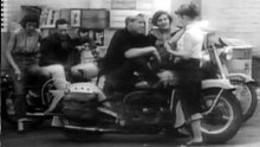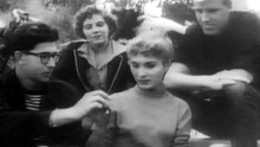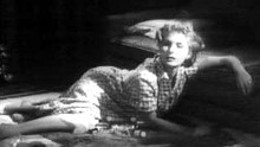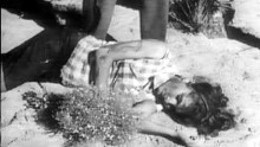|
Our
film begins with a slow pan of a city; a
city like any other city; a city that
could be mine, or yours -- or any 1950ís
era police drama. Zeroing in on a hospital
entrance, a narrator quickly introduces
us to the players in our forthcoming
melodrama as they are escorted to a
waiting police car. First
is Cassandra Lee (Barbara
Marks). Apparently, Cassie, who has just been
through a three-year ordeal of crime and
drug-addiction, is in the process of
being transferred to a federal hospital for
mandated rehabilitation. Accompanied
by her mom (Lucile Price)
and her most recent step-dad, the
girl is herded along by a Lt.
Jason (Robert Sherry),
who
will provide a police escort to the train station --
and who will also serve as the narrator, a
vital role as there is almost no dialogue
in this whole film. As they leave, Jason
spots Cholo Martinez (Bamlet
Lawrence Price Jr. -- and we'll be dealing
with him in a minute), Cassieís former
boyfriend and heroin supplier, following
them. A target of several outstanding
warrants, Jason secretly calls for some back-up
to take the pusher down. Baiting the
thug along toward the station, the
detective fears that Cassie might tip-off her former lover
before help can arrive, and while the
dragnet slowly closes in, Jason decides to tell
us all about the girl's sad and harrowing journey from
normal everyday teen to heroin-addicted thief
and drug-pusher.
Uh-oh,
flashback:
As
we turn back the clock, we see that Cassie
didn't have a very happy home life. Taking the
Elizabeth Taylor approach to marriage, Mom
hasnít set a very good example, and
since her life hasnít been fulfilled,
she takes these frustrations out on her
daughter. Working at Momís Five and Dime,
that's close to a motorcycle-repair shop,
Cassie quickly falls for a tuff named
Packard (William Kendall), who offers her a ride. Unimpressed with
the young punk, when Mom wags a forbidding
finger, Cassie replies with another
finger, hops on the bike, and away they go,
down the road to ruin, clutching a one way
ticket to hell...

__ __
__ __ __ __
__ __ __ __
__ __ __ __
__ __
In
making the picture, One Way Ticket to Hell,
the producers felt they were doing a
public service by exposing this menace to
the people of the nation. All should see One
Way Ticket to Hell,
for if this picture will save one life
from the ravages of this evil then this
film was not made in vain. A must for
every person in the United States who is
interested in their personal health as
well as their loved ones.
--
From the Press Material
__ __
__ __ __ __
__ __ __ __
__ __ __ __
__ __
Based
on six months of research into the growing
problem of juvenile narcotics addiction,
Teenage Devil Dolls -- a/k/a
One Way
Ticket to Hell -- began life as Bamlet
Lawrence Price Jr.'s senior documentary
thesis as he finished up film school at
UCLA. Tapping into America's acute sense
of paranoia on such matters, Price's
seedy, no-frill's tale of a good girl gone
bad has a strange sense of verisimilitude
that strikes a chord with the viewer as we
wallow around the underbelly of Los
Angeles -- but it is a short note that
quickly fades as we're rapidly buried
under an avalanche of some hilarious prosthelytizing
and brow-beating cynicism on the
evils of America's rampant youth.
Seriously,
the
film is nothing but one long narrative by
Lt. Jason doing his best Sgt. Joe Friday
imitation. Alas, Robert Sherry is no Jack
Webb -- though he tries his damndest to match
Webb's droll, matter-of-fact cadence and
brow-beating cynicism, he can't pull it
off. Very
straightforward while spouting of his pop-psychology and describing the slang
terms used by the junkies, he also ends
every sentence with an aside of moralistic
indignity about the entire goings on that
will leave you chuckling.
An
aside of moralistic indignity? Did I just
type that? What does that even mean?
As
with most films of this type, drugs are
only one of the symptoms of a much larger
disease -- the impending implosion of the
American family unit. And also like most
other films of this ilk, hiding the
accusations behind the drug use,
rabble-rousing, and thrill-killing, the
blame falls surreptitiously on the mother,
who in this enlightened, post-war age no longer remained at home to mind the
children. Price's docu-drama is no
different. Essentially rebelling against
her mother and the bad example she's set,
an emotionally starved Cassie begins
running with Packard's crowd in an attempt
to fit in at least somewhere. At first,
the girl resists the temptation of the
reefer, but eventually caves to pressure
and tokes up.

What
follows is a typical cinematic marihuana
reaction: hysterical giggling followed
by a glassy, thousand-yard stare, which
is totally unbelievable because not a
one of them gets the munchies.
Soon
enough, these extracurricular activities
have an adverse effect on her schoolwork
and in short order, Cassie flunks out and
loses all her old friends -- except for
Johnny (Robert
Norman),
who always had a crush on her.
Eventually, he sways her back to the
straight and narrow. They even get
married, but she doesnít adjust well to
domesticated life and it isnít long
before Cassieís running off with Packard
and toking up a storm again. Johnny --
being another kind of dope --
sticks with her. Getting her a
psychiatrist, sedatives, and a new puppy,
doesn't help, though, and Cassie appears
to be headed for a nervous breakdown. As
their home life continues to crumble, her
outbursts get so bad that Johnny is constantly
sent home from work to straighten his wife
out. And on one particular occasion he
arrives home to discover Cassie has forged
her own prescription refills, is addicted
to goofballs, and in the middle of a
suicide attempt! Another trip home finds
her over-medicated again and tripping out
in the front yard, and when Johnny heads
inside to call for help, Cassie,
meanwhile, crawls into their car, cranks
it up, and proceeds to wreck it.
After
serving a brief sentence for DUI, Cassie
is released into the custody of her
parents and her husband -- but none of
them appear to be too happy that sheís
out. Looking to link up with Packard
again,
Cassie immediately violates her probation
and runs away. It is here where she first
meets Lt. Jason, posing as buyer, who's
looking for Packard to bust him for
pushing. Putting Cassie under
surveillance, he watches her work as a
car-hop and soon discovers the drive-in
restaurant is nothing but a front where
the waitresses deliver drugs to customers
taped to the bottom of the food trays. And
Cassie does such a good job that the big
boss promotes her to run an apartment
where kids come to get high. (Oh,
no. Itís turning into Reefer
Madness.)
The
only problem is, Cassie has a bad habit of
using all the drugs for herself! And
little does she know, but the apartment
has been staked out for a months. But when
the place is raided, the evidence is
ground up in the garbage disposal before
the police can seize it. They still have
enough to convict Cassie on another
charge, but instead,
Jason decides to put her on probation (--
Again? --) and wants to turn her
into an informant. He knows sheíll
accept the offer because all junkies are
born narcs who'll drop a dime on anybody
as long as they get their next fix.
While
on probation, Cassie rats out a few other
pushers but nothing real substantial. And
as soon as her probation ends, she
disappears off the radar again until
stumbling
upon Marge Rossi (Elaine
Lindenbaum) in a back alley while
they're both going through heroin
withdrawal. The two eventually dry out, hit it off and soon go
into business for themselves pushing
reefer. Quickly creating a monopoly (--
Jason says itís because people enjoy the
novelty of getting their drugs from two
women --), the girls just as
quickly piss off the wrong people -- and
one man in particular: a Sven Berman a/k/a
the drug king of this unnamed city.
Rounding the girls up, Sven (Joel
Climenhaga) forcefully re-addicts
Marge to heroin but Cassie gives herself
willingly to the needle. Four months
later, sheís found in another alley
going through withdrawal. This time, her
parents commit her to the psycho-ward to
dry out, but this also fails when Marge
manages to sneak in a heroin fix
whenever Cassie needs it.

Meanwhile,
the City Fathers, tired of the growing
drug epidemic, prod the police into Operation: Clean Up. A massive
round-up of all drug pushers and addicts ensues, but
Sven evades capture. Thinking Marge ratted
him, he kills her. Time
passes, but Cassie still hasnít learned
her lesson and has now taken up with Cholo
Martinez and his partner, Sanchez. (What
happened to Sven? I donít know. I might
have dozed off. Sorry everybody.) Together,
theyíve formed a car-theft ring that
exchanges the stolen autos for heroin down
in Mexico to be sold back in the States.
Again, they donít realize that they are
under the watchful eye of the police and
are about to be the victims of a trap
about to be sprung. Snatching another car,
the trio heads for the border. Jason tails
them,
hoping to nab the Mexican drug source. At
a gas station near the border, they close
in and finally make their move ... The cops do nail
Sanchez, but Martinez and Cassie manage to
escape. Covering all roads into Mexico,
the authorities soon discover the couple's
abandoned car -- and their stash of
heroin -- and it appears they fled into
the desert on foot, where Jason almost feels
sorry for them out in that heat, stuck
without their junk, going through
withdrawal.
Shakin'
and bakin', Martinez and Cassie manage to
find some shade but canít escape the
effects of the heroin -- and soon they're both going
bonkers, flying into a raging,
foaming-at-the-mouth fit. And since the
filmís barely broken the 45-minute
barrier (-- yep, all a that in
under 45 minutes), we get a long,
long sequence of the local posse combing the
desert looking for them. Fifteen padded
minutes later, they find Cassie, barely
alive, but Martinez has given them the slip
again. (And I think I know why.
More on this later.)

...Thus
endeth the flashback.
Back
at the station, just as the train comes to
a stop, the police quickly nab Martinez without incident. (Rather
anti-climatically, I might add.)
After Cassie and her mother board the
train, as it departs, we're on the verge
of a happy ending until Jason reminds us that
there is no guarantee that Cassie will get
better. And judging by her history, you kinda doubt it.
Bummer.
The
End
Wow.
They didnít even bother to change the
names to protect the innocent in this one
because everybodyís guilty in this
thing! And
the moral of the story?
(I mean
besides the fact that thereís more than one way
to pad out a film.)
Donít accept
motorcycle rides from strangers. Avoid
tripped-out vagrants in any back alleyways. And contrary to
popular belief, a new puppy will not
break someone of their dope-addiction.
Again.
Wow.
This
caustic, cautionary tale of a clean-cut girl led down the path
of addiction and self-destruction, Teenage
Devil Dolls
was the actual inspiration for this J.D.ís
and Rocket-Bras retrospective, and one
can only boggle at its origins.
Taking
two years to complete at a cost of
about $14000, Price's student film quickly
gained some notoriety when it received a
few national awards, including one from
the Producer's Guild of America, and that
generated enough buzz that eventually led
to a theatrical release. As the '50s gave
way to the 1960's, with the loosening-up
of the production code's stringent rules
on such taboo subjects, Teenage
Devil Dolls
could also be considered one of the last
pictures of its kind as films about
drug-use became less stridently docu-
and more sympathetic drama. And maybe that
wasn't such a bad thing. Looking at it
today, one can't help but notice that
pretty white girl Cassie is given chance
after chance to reform while Sven and
Martinez -- both dirty foreigners, are
deemed a menace and will be locked-up and
stamped out for good if ever caught. Sad.
And
I do find it a little absurd when it appears
every
single person in town -- aside from Johnny
and the police force -- is addicted to something.
This is hilariously punctuated during Operation: Clean Up as the
entire town -- deprived of its drugs -- goes
through one mass withdrawal. People
collapse everywhere: in phone booths, on
the streets and in the parks -- and
everyone one of them reduced to quivering
and foaming idiot. Also note
how when we begin the flashback, Jason
says Cassie went through a three-year
ordeal, but with each step he takes us through, he
gives us the dates and places -- and if
you add it all up it equals to, oh, about
twenty or so years. And check out the
stock-soundtrack. If it sounds familiar it
should; itís the same incidental music
you hear in all those old Hanna-Barbera
cartoons like Space
Ghost, The
Herculoids
and Scooby
Doo.
Zoinks!
Teenage
Devil Dolls
appears
to be Price's only film -- maybe he was
just burned out after writing, directing,
producing, editing and starring as the
villain in the first one. Looking at the
cast list, the credits are littered with
other Prices, including his mom, dad and
sister. And if you look closely, not only
is Price playing Martinez, but I'm pretty
sure that's also him playing the
eye-patched Sheriff down on the Mexican
border. That's right: as we cut from
scenes of him wigging out as Martinez, we
switch to him as the Sheriff looking for
himself as Martinez. Again, this goes on
for almost fifteen minutes. (No
wonder it took so long.) Still,
I wouldn't call his brief career in
Hollywood a complete failure. He was
married to Honey
West
star Anne Francis for several years after
all, but alas, that ended in divorce right
after the completion of the film.
|